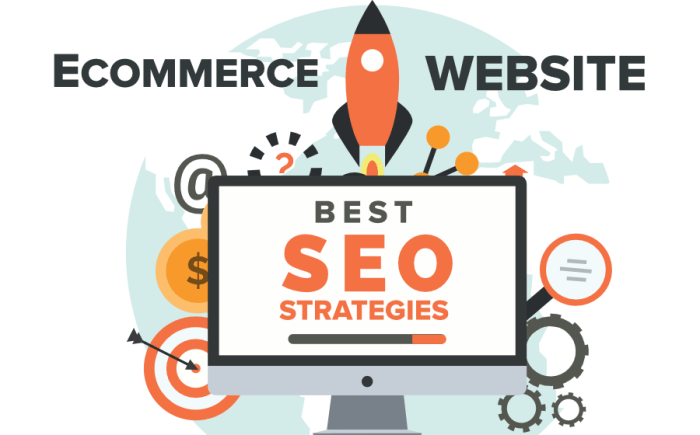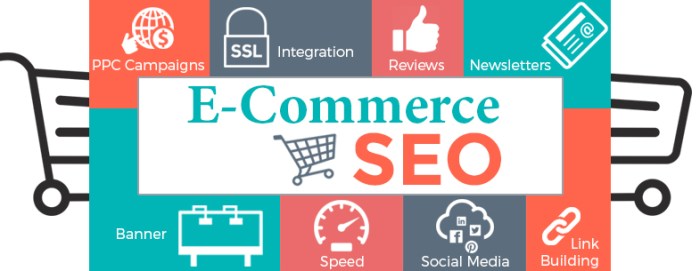SEO for E-commerce Websites – for E-commerce Websites kicks off with a bang, diving into the world of optimizing online stores to drive traffic and increase revenue. From enhancing search engine rankings to improving product descriptions, this topic covers it all.
Get ready to explore the ins and outs of for E-commerce Websites in this informative guide.
Importance of for E-commerce Websites
In today’s digital age, having a strong online presence is crucial for the success of any e-commerce business. One of the most powerful tools in achieving this is Search Engine Optimization (). plays a vital role in driving organic traffic to e-commerce websites, which means attracting visitors who are actively searching for products or services that the online store offers.
By optimizing the website for search engines, such as Google, businesses can increase their visibility and reach a larger audience of potential customers.
Enhanced Visibility and Search Engine Rankings
helps online stores rank higher in search engine results pages (SERPs), making it easier for customers to find them when searching for relevant s. By appearing at the top of search results, e-commerce websites can attract more organic traffic and increase their chances of making sales.
- Optimizing website content with relevant s and phrases
- Improving website speed and user experience
- Building high-quality backlinks from reputable websites
- Creating engaging and shareable content
By implementing effective strategies, e-commerce websites can improve their search engine rankings and attract more potential customers.
Increased Sales and Revenue, SEO for E-commerce Websites
is directly linked to the success of e-commerce businesses in terms of generating sales and revenue. When a website ranks higher in search results, it is more likely to receive clicks from users who are actively looking to make a purchase. This increased visibility can lead to higher conversion rates and ultimately, more sales.
- Targeting specific s related to products or services
- Optimizing product pages for search engines
- Implementing local strategies for brick-and-mortar stores
- Monitoring and analyzing website traffic and performance
plays a crucial role in increasing sales and revenue for e-commerce businesses by driving targeted traffic to their websites and improving conversion rates.
On-Page Techniques for E-commerce: SEO For E-commerce Websites
When it comes to optimizing e-commerce websites for search engines, on-page techniques play a crucial role in improving visibility and driving organic traffic. By focusing on elements within the website itself, e-commerce businesses can enhance their performance and attract more potential customers.
Optimizing Product Pages
One of the key on-page strategies for e-commerce websites is optimizing product pages. This involves creating unique and descriptive product titles, incorporating relevant s, and providing high-quality images to showcase the products. By ensuring that each product page is well-structured and contains valuable information, businesses can improve their search engine rankings and attract more organic traffic.
Optimizing Meta Tags and URLs
Another important aspect of on-page for e-commerce is optimizing meta tags and URLs. This includes creating compelling meta titles and descriptions that accurately reflect the content of the page, as well as using -rich URLs that are easy for both search engines and users to understand. By optimizing these elements, e-commerce websites can improve their click-through rates and enhance their overall performance.
Importance of High-Quality Product Descriptions and Images
High-quality product descriptions and images are essential for in e-commerce. Detailed product descriptions not only help search engines understand the content of the page but also provide valuable information to potential customers. Similarly, high-resolution images can improve user experience and encourage visitors to stay on the website longer. By investing in quality product descriptions and images, e-commerce businesses can boost their efforts and increase conversions.
Off-Page Strategies for E-commerce

When it comes to optimizing an e-commerce website for search engines, off-page strategies play a crucial role in improving visibility and driving organic traffic. These strategies focus on factors outside of the website itself that impact its search engine rankings.
Significance of Backlinks in E-commerce
Backlinks are links from other websites that direct traffic to your online store. They are like upvotes from other sites, indicating to search engines that your website is credible and relevant. Backlinks are one of the most important ranking factors for e-commerce .
- Quality backlinks from authoritative websites can significantly boost your online store’s visibility in search engine results pages (SERPs).
- Backlinks help search engines determine the credibility and trustworthiness of your e-commerce site, leading to higher rankings.
- Building a strong backlink profile can improve your website’s domain authority and overall performance.
Building a Strong Backlink Profile for an Online Store
Creating a strong backlink profile requires a strategic approach to acquiring high-quality backlinks from reputable websites relevant to your industry or niche.
- Guest posting on industry-related blogs and websites can help you earn valuable backlinks while establishing your authority in the field.
- Engaging in influencer collaborations and partnerships can lead to natural backlinks from influential personalities in your industry.
- Submitting your e-commerce site to online directories and review sites can also generate backlinks and improve your website’s visibility.
Role of Social Media Marketing in Off-Page for E-commerce Websites
Social media marketing plays a vital role in off-page for e-commerce websites by increasing brand awareness, driving traffic, and generating social signals that can impact search engine rankings.
- Sharing valuable content on social media platforms can attract engagement and encourage users to share your content, leading to natural backlinks.
- Engaging with your audience on social media can build relationships and foster brand loyalty, influencing how users perceive and interact with your e-commerce site.
- Utilizing social media advertising can help target specific audiences and drive traffic to your online store, potentially resulting in more backlinks and improved performance.
Technical for E-commerce Platforms

When it comes to optimizing an e-commerce website for search engines, technical plays a crucial role in improving visibility and ranking. Technical aspects such as site speed, mobile optimization, schema markup, site structure, navigation, internal linking, SSL certificates, and secure payment gateways are all essential for a successful strategy.
Site Speed and Mobile Optimization
- Site speed is a critical factor in as search engines prioritize fast-loading websites. Optimize images, minify CSS and JS files, leverage browser caching, and use a content delivery network (CDN) to improve site speed.
- Mobile optimization is key as more users access e-commerce sites through mobile devices. Ensure responsive design, mobile-friendly layouts, and fast load times on mobile for better rankings.
Schema Markup and Rich Snippets
- Implementing schema markup helps search engines understand the content on your site better, leading to rich snippets in search results. Use schema markup for products, reviews, prices, and availability to enhance visibility.
Site Structure, Navigation, and Internal Linking
- Organize your site structure logically with clear categories, subcategories, and product pages. Create XML sitemaps and optimize internal linking to improve crawlability and indexation.
- Optimize navigation menus for user experience and search engine bots. Use descriptive anchor text for internal links and ensure a smooth flow throughout the site.
SSL Certificates and Secure Payment Gateways
- Having an SSL certificate is not only essential for secure transactions but also a ranking factor in . Secure your website with HTTPS to build trust with users and search engines.
- Integrating secure payment gateways adds an extra layer of protection for customer data. Choose reputable payment processors and display trust badges to boost credibility and .